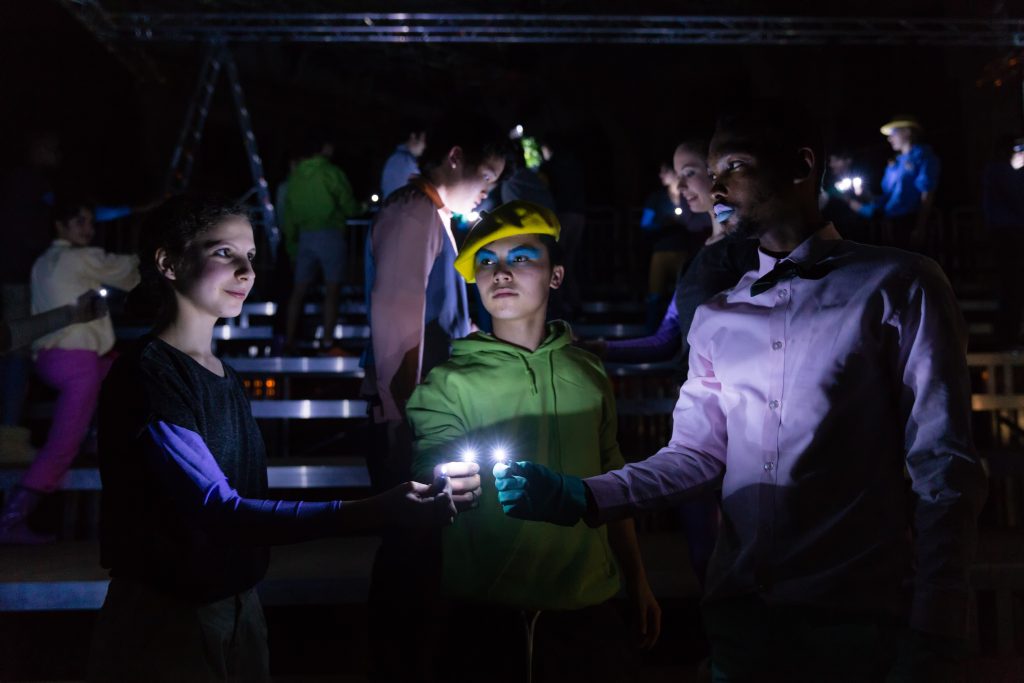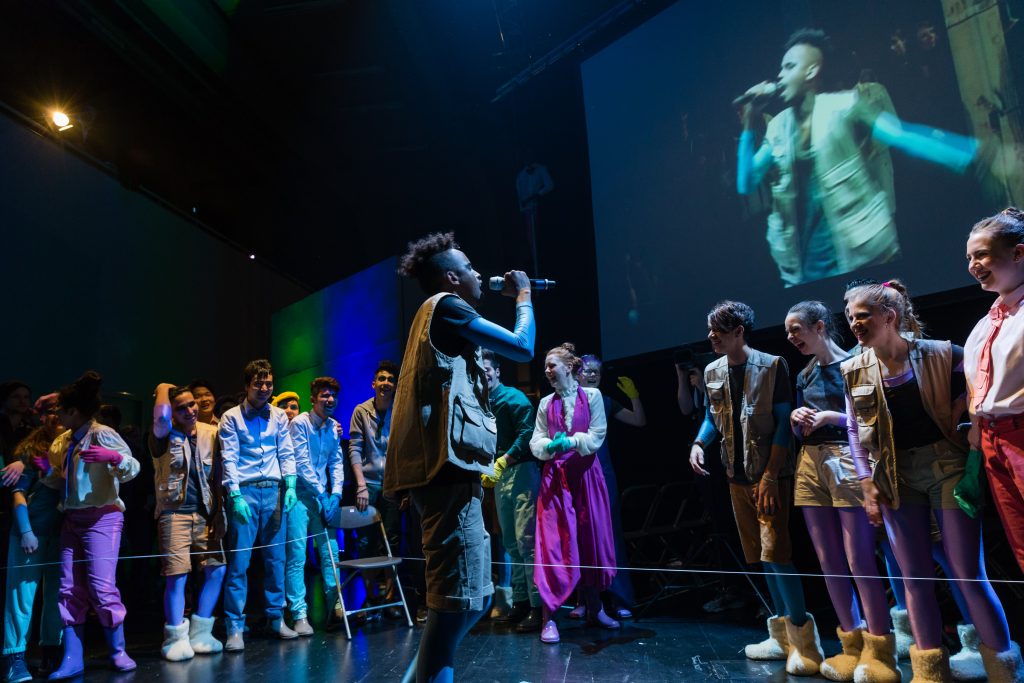By Tamara Schmidt
At the Deutsche Oper Berlin (German Opera Berlin), world-renowned singers perform classical opera
repertoires and famous conductors lead one of the most distinguished orchestras in Germany.
So what kind of self-image of an opera house is conveyed when young people who might have never
seen an opera before, create a piece of music theatre of which they are the genuine authors and
performers? What does it mean for the artistic process when the stage is handed over to young people
with a variety of backgrounds? What does it mean for the audience, when young refugees take over the
opera house like their own place so that the guests (= audience) feel like strangers? And what kind of
political dimension does inclusion and participation really imply – who is participating with whom, in what
way and why?

Photo by Stephan Boegel – Deutsche Oper Berlin
Between February and April 2016, 50 young people founded an new state in the Tischlerei (Old Carpenter’s Workshop), the second stage of the Deutsche Oper Berlin. One half of the group were newly
arrived refugees, the other were young people from Berlin. In this project of the Junge Deutsche Oper
the directors Martin G. Berger and Jonas Egloff divided the participants into groups of experts who
created the basic principles of a fictional society: language, religion, political system, architecture,
currency, daily routines. The only requirement was, that all and everything in this state of “Blomagal” (Blo = country, magal = new) should differ from the respective home country. Sounds played an important
role in Blomagal: on the one hand sounds were produced in a factory. These secured the economic
existence of the landlocked country of Blomagal via a bilateral treaty with the artistic director of Deutsche
Oper Berlin. In addition, each family created its own sound language, the residents of Blomagal
(„Blomagalgre“) recorded pop music for Blomagal’s entertainment industry, an opera was composed etc.
The project’s results were performed three times and the performance consisted of several parts: At first
the audience experienced the daily life (“samitik“) of Blomagal for several hours in a walk-through
installation where the Tischlerei`s exterior walls acted as Blomagal’s borders. Secondly, the audience
experienced traditional celebrations of the state ́s founding myth. Through this celebration the
development process of the project was presented in an exaggerated, fantastic-mythological way: from
the first meeting through crises and risks taken to success.
A role reversal took place between the performers and the audience: One group of spectators was
guided through the installation, another group had to attend a language and regional studies course
before entering the stage. A third group was left alone in this foreign state (and it might happen that a
few of these audience members left the performance), and a fourth group could only enter Blomagal
towards the end of the performance after having to find their own way to the stage (encountering many
dead-ends) through the backstage maze of the opera house. No refugee stories were meant to be
brought onto stage, no misfortune should be exhibited and no differences emphasized. Instead, the
experience of being on the road and arriving somewhere should be felt and understood through the
medium of music theatre.
Everything had to be newly invented in this project, hierarchies based on expertise and knowledge
became irrelevant. Refugees became performers who created their environment themselves. At the
same time, young people from Berlin were relieved of their role as helpers. The group of young people
became one unified entity due to, amongst other reasons, the identity-forming and momentous
experience of founding their new state.
Ordinary and existential questions alike were discussed in small groups and tested on stage in the
process of forming Blomagal: During the rehearsals everything was possible and results were
determined with the help of various decision making strategies. This kind of democratic participation lead
to questioning the usual roles within the artistic team: Should we intervene if there is a majority vote for
establishing a monarchy as the political system or for installing a strict criminal law? And if so, in which
way? How could advice, if any, be given cautiously and artistically? The balance between responsibility
based on artistic experience and the true participation of the young people as experts of their own
realities, was continuously negotiated.
The discussions did not end on the rehearsal stage; a transfer took place between the play and the lives
of the young people. They were empowered to claim their rights, to negotiate prior agreements entered
into with the project team and to make decisions for themselves, individually and as a group. However,
these topics were not only artistic or content-based, but also raised questions which concerned the
structure of the Deutsche Oper Berlin: Why does the cafeteria offer only a few dishes which are “halal”?
Why is this project prominently titled as “with refugees” in the publications of the Deutsche Oper Berlin?
Who communicates with whom and to what end?
The young people did not create a utopian state. Instead, Blomagal was an artistically exciting final
product of a consensus of its residents, of many artistic decisions and social negotiations between very
different young people and the artistic team of a big opera house. Maybe this is precisely the vision of
this project.
Tamara Schmidt heads the “Young German Opera“ (Junge Deutsche Oper) in Berlin since 2015. She
develops participatory and transcultural projects, works as artistic director, project manager and
dramaturg.
www.deutscheoperberlin.de/de_DE/youngopera

Photoes by Stephan Boegel – Deutsche Oper Berlin



